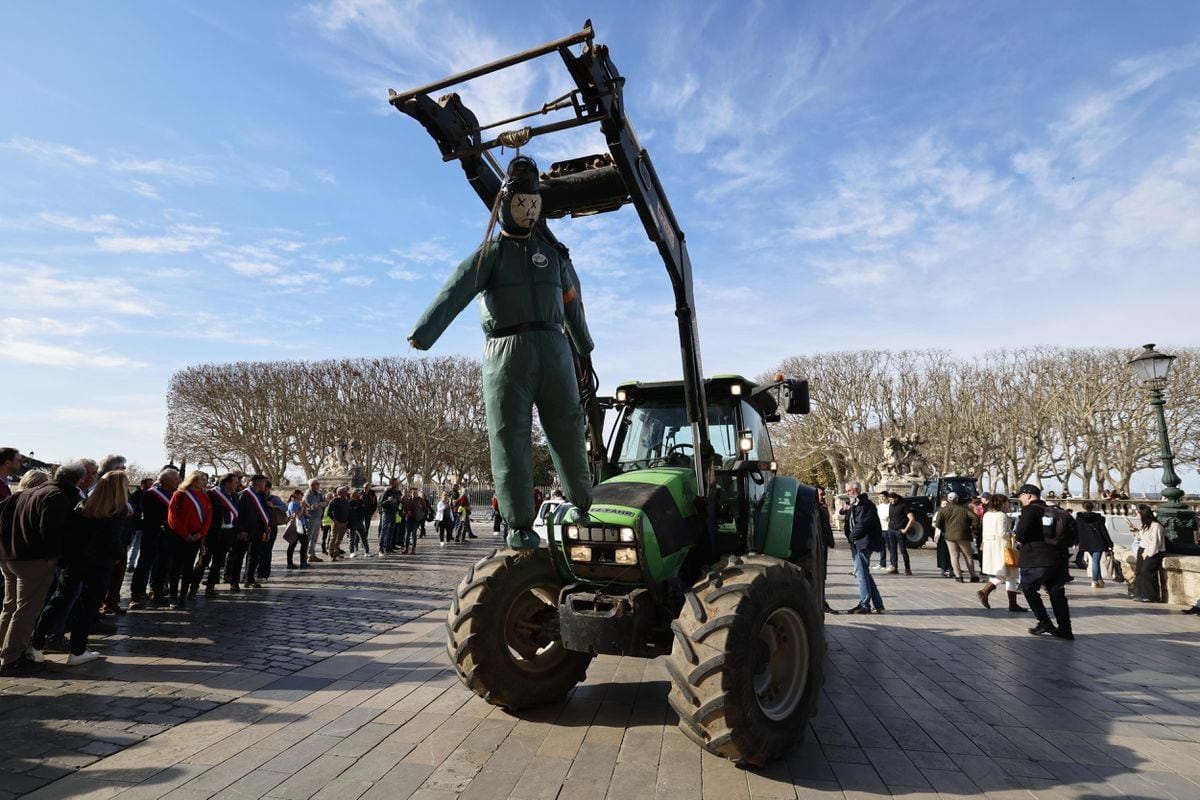The anger of the French countryside, which threatens to overflow, is already reaching the doors of Paris, and the new Prime Minister, Gabriel Attal, is trying his best to stop a protest that the extreme right is instrumentalizing with a view to the European elections in June.
The response to the unrest has come in the form of an announcement, made by the young Attal this Friday in the southwest of France;
This is a battery of measures to alleviate the financial burden and bureaucratic obstacles that the sector endures.
Above all, he represents a seduction operation to convince farmers that there is nothing more important than them and that the Government will do what is necessary to respond to their demands.
He did not convince: the main union, the FNSEA, said it was maintaining the mobilization.
“We have decided to put farmers above all else,” said Attal in a speech at a cattle farm in Montastruc-de-Salies, a municipality in the province of Haute-Garonne.
And he repeated several times, in case anyone had not understood it, the key concept: “Above all.
Above all the rest.”
Then he added: “France, without agriculture, would not be France.”
Meanwhile, traffic closures multiplied on dozens of highways and roads throughout the country.
The blockades began just over a week ago on a highway south of Toulouse and in this time it has become the first crisis that Attal, a 34-year-old professional politician, has faced since President Emmanuel Macron appointed him on January 9 .
French farmers' tractors block the A1 motorway in Chamant, near Paris, this Friday.
YVES HERMAN (REUTERS)
On Thursday, the FNSEA counted 75,000 mobilized farmers and 41,000 tractors in 85 of the 101 French provinces.
There have been violent actions, such as the burning, during a demonstration this Friday, of a building of the Mutua Social Agrícola in the southern city of Narbonne.
On Tuesday, two people died – a 54-year-old farmer and her 14-year-old daughter – after a car accidentally crashed into a roadblock in Pamiers, near the border with Spain.
The barriers at five access points to Paris, for the first time this Friday, should have been a warning: the movement can grow and, if necessary, enter the capital.
This is a popular movement, with symbolic capital—farmers and peasants feed the country, connect it with the land, preserve the essences—that is the envy of other sectors.
It is a movement, furthermore, with decades of experience in blocking roads and other forms of protest: the
agricultural demonstration
is almost a hallmark of France.
It is a rather conservative movement that has always enjoyed the benevolence of the authorities.
The farmer is listened to, he is respected.
In a part of the left, critical of the heavy hand of the police in social or environmental protests, and frustrated by so many failed demands, it is seen as a comparative grievance.
Dilemma of the rulers
Among the measures to appease the anger of the countryside, Attal has announced the relief of bureaucratic obstacles and sanctions for industrialists and large stores that do not respect the fair distribution of income with producers.
The main measure is the elimination of the increase in the rate on diesel used by tractors, one of the demands that triggered the protest.
He touches squarely on the dilemma of some rulers: how to combat climate change without harming certain sectors, which are sometimes the most disadvantaged.
This is not the case for all farmers, nor for all agricultural sectors, but many complain about the drop in income, bureaucratic overload and international competition.
And they feel unfairly singled out by environmentalists.
The protests have given them a visibility that they have not had in years, and at a time when places like the Netherlands or Germany have seen similar mobilizations.
There is a common denominator: the rejection of environmental regulations that they consider harm them, and the search for recognition.
These countries also share the good positioning of the extreme right for European women.
And the image of a polarization between city and countryside;
the elites and people.
It could remind you of the French
yellow vests
, who in 2018 put Macron on the ropes.
But the differences are considerable: farmers are organized in powerful unions and have practiced negotiation.
The French Prime Minister, Gabriel Attal, at the Montastruc-de-Salies cattle farm, where this Friday he announced relief measures for farmers.
NACHO TWELVE (REUTERS)
However, the speed with which the protests have flared up has worried Macron.
A little more than half a year after the riots in the multicultural suburbs, a year after the start of the protests against the pension reform, and five after the
yellow vests,
the last thing the president wants is another social crisis.
And worse, in the countryside, which has so much symbolic meaning in France.
Attal, in his true debut in office, rolled up his sleeves this Friday and went down into the mud.
In his speech on the farm he launched a panegyric, with patriotic accents, of agriculture.
And he visited a blockade point on the A64 motorway to debate with the farmers.
“I have received the message,” he said.
“I have heard you.”
The president of the FNSEA, Arnaud Rousseau, replied: “What has been said this afternoon does not calm the anger, we must go further.”
Attal's success or failure in managing the crisis could mark his time as head of the Government.
He is on trial.
Follow all the international information on
and
X
, or in
our weekly newsletter
.
Subscribe to continue reading
Read without limits
Keep reading
I am already a subscriber
_

